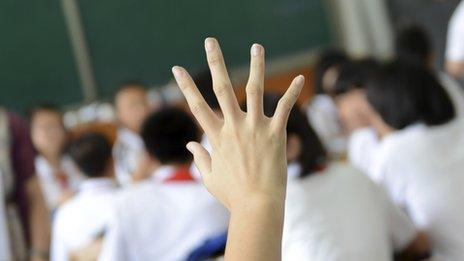Make PSHE lessons compulsory, says Green Party MP
- Published

PSHE covers health, wellbeing, relationships and living in the wider world
Personal, social, health and economic education (PSHE) should be a statutory subject in all state schools in England, campaigners say.
Green Party MP Caroline Lucas is reintroducing a bill in Parliament saying PSHE is a "crucial part" of children's education.
Ms Lucas previously tabled a bill for compulsory PSHE in July 2014.
Critics say the issues covered in these lessons are the responsibility of parents, not schools.
Currently the subject, which covers core issues relating to health and wellbeing, relationships and living in the wider world, is not statutory in England.
But the national curriculum says all schools should make provision for PSHE using high quality teaching resources.
The PSHE Bill was presented to Parliament for its first reading on 7 July 2014 but there was no debate and it made no further progress.
Now Ms Lucas wants ministers to look at the issue again and introduced a bill under the 10-minute rule on Wednesday.
The bill would require:
PSHE to be a statutory subject for all state-funded schools in England and Wales
for these lessons to include Sex and Relationships Education (SRE)
education on ending violence against women and girls
teacher training and guidance on best practice for delivering these lessons
Safeguarding
Ms Lucas said PSHE was a "crucial part" of a child's education and claimed to have widespread support for the bill.
"Lessons which help keep young people safe, healthy and happy and aid employability shouldn't be subject to a postcode lottery," she said.
"As well as being an essential part of safeguarding our children, PSHE has huge potential in relation to employability and academic attainment.
"PSHE teaches young people the skills they need to make good choices and to think things through."
But Norman Wells, director of the Family Education Trust, said this was the responsibility of parents, and the state - through schools and other agencies - should not undermine them by assuming a parental role.
"Most of the components of PSHE are the primary responsibility of parents; for example, nutrition and physical activity, drugs, alcohol and tobacco education, sex and relationships education, emotional health and wellbeing, safety and personal finance," said Mr Wells.
"There is no question that the more that schools take responsibility to themselves for these areas, the less that parents will see them as their responsibility.
Caroline Lucas first raised the issue in parliament a year ago
"If PSHE were to become a statutory part of the curriculum alongside other curriculum subjects, there would be a very real danger that parents would no more consider themselves responsible for these aspects of their children's physical, emotional and social development than they typically regard themselves as responsible for the teaching of English, maths, history and science."
Sexualisation fears
Ms Lucas said it was important to dispel some of the concerns some people have surrounding PSHE.
"I know that some people fear that PSHE can expose children to sexualisation but the exact opposite is true," she said.
"A PSHE lesson for younger children wouldn't be exposing them to anything graphic or upsetting. It would work to improve children's grasp of what it means to give and receive consent generally.
"The idea is that this gives them the solid building blocks they need as they encounter more complicated situations as they get older."
A spokesman for the Department for Education said: "PSHE is a vital part of preparing young people for life in modern Britain and we know good schools are already offering it.
"We continue to work with experts in the sector to ensure schools are properly supported with high-quality teaching resources."
- Published17 February 2015